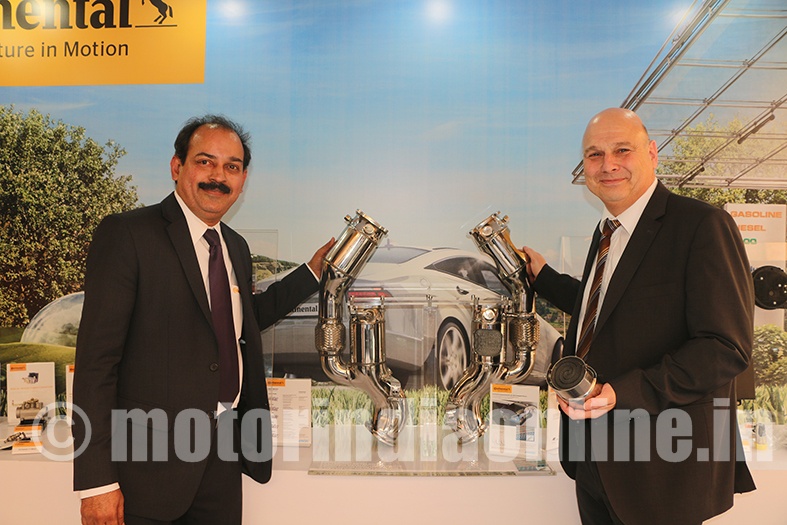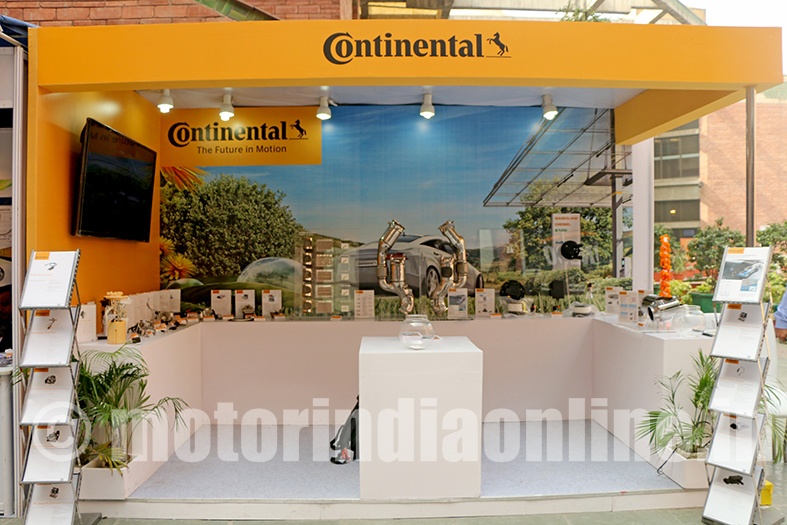In an exclusive interview to MOTORINDIA held on the sidelines of ECMA’s ECT-2016 Annual Conference in New Delhi, Mr. Rolf Brück, Vice President Catalysts & Filters, Business Unit Fuel & Exhaust Management, Continental Emitec GmbH, and Mr. K.V.R. Babu, ECMA President, and Managing Director, Continental Emitec India, gave out details of the changing emission norms in the country and the company approach to the switch-over to the new norms.

Excerpts:
What is your take on the changing emission norms in the country and how are you geared accordingly?
K.V.R. Babu: We are going to have the BS-IV emission norms across the country by next year. Before that, the emission norms started a bit earlier in major Tier-1 cities. By April next, we will be having a similar norm across the country in all segments, including two and three-wheelers, as well as commercial and passenger vehicles. For two and three-wheeler segments, we have a lot of applications which will go into mass production by next year. We have new technologies with the efficiency of which catalytic converters can be improved, thereby reducing the size of the catalysts for example. So there are various emission technologies available with us.
Do you have any products for commercial vehicles?
K.V.R. Babu: Yes, we do have products for commercial vehicles which will be crucial for us, some applications using our particulate filters, especially DPFs. Currently sold in a few cities, it will be spread across the country. We have localized almost all the technologies for the Indian market. We are trying to widen the ranges by increasing the diameters. We are introducing some new structures in the Indian market. We have a plant in Pune and are catering to the Indian market.

With the acquisition of Emitec, what type of changes have taken place in the organization?
Rolf Brück: To give you a simple answer, the former Emitec GmbH was renamed Continental Emitec. We are now within the Powertrain organisation, which has five business units. One of them was Fuel Supply which was renamed Fuel and Exhaust Management. This means we belong to Fuel and Exhaust Management within the Powertrain division. No major things have changed. This means we still have our plants and development (facility). The huge advantage is that within the Continental world, we have much more access to the complete system such as sensors, actuators, etc. If we think about Euro-VI / BS-VI, we are supporting them (OEMs) out of Europe and are ready for the Indian market.
Can we expect Continental to bring some advanced technologies for the Indian market?
Rolf Brück: I would like to answer it with yes and no. We have BS-VI coming up in 2020, and that is a very short time. For this, we have to bring the proven technology for India. We are integrating sensors to catalysts. By that, we have a nice choice to offer a specific system approach to fulfil full RDE. And then there is a question of conformity effect in India.
Is this integration technology specific for the Indian market?
Rolf Brück: No, it is for the worldwide market. There is no difference in the business that we are doing in Europe, the US and India. This is especially when the emission legislations are coming very close together. The fuel has to be adapted and that is very clear and will happen. So that will enable us to have a one level of technology worldwide.
What is your take on the Government plan of leapfrogging with regard to the emission norms? Do you welcome the move?
Rolf Brück: I think the move is very positive. It is very interesting, and I had some discussion with engineers pertaining to the difference between Euro-V and Euro VI. Likewise, we discussed the difference between with RDE and without RDE. So we are deliberating how much development we will be putting into 2020 knowing that we might have to change it in the future. Here again, the kind of experience we have all over the market helps us serve our customers better.
Mr. Babu, you also represent ECMA as a President. So are you really happy with the Government’s decision. Is the industry ready to meet the regulation norms?
Yes, of course we have all the solutions available. It is only the question of timeline for implementation. It is a big challenge for us because we have to scale up for whatever we have today. If you talk about the two-wheeler industry, the numbers are huge. It is not only the exhaust after-treatment but also fuel injection systems, electronics, etc. The moment you get into 2020, we really need to scale up our volumes. The technologies are available, but we have to adapt them to Indian conditions.
Do you think the Indian companies can afford to invest in those technologies?
K.V.R. Babu: I think it is possible, and we are all working for environment conservation. We need to sacrifice somewhere to make our vehicles eco-friendly.
Have you, on behalf of ECMA, given any recommendations to the Government for such policies?
K.V.R. Babu: Yes, we are working very closely with the Government and are giving all the inputs as and when required. We are a part of the Steering Committee and are very much involved as an association in ECMA activities. We have given some retrofitment proposals and suggestions. We have also given some plans to start some testing and development activities for retrofitment. Once that is done, we can go into retrofitment as well.
So is the automotive industry ready to meet such a challenge?
K.V.R. Babu: Yes, I do think so.
Do you expect any delay in terms of time fixation from the Government?
K.V.R. Babu: No, I don’t think so. All the decisions have been firmed up and there won’t be any delays. From our side, we are ready.
On behalf of ECMA, has there been any roadmap for the emission norms?
K.V.R. Babu: We have been preparing roadmaps for a very long time. After a lot of deliberations and discussions, now the first plan has come. Maybe, there was a time-lag of three or four years and we have to cover it up. We are in line with the Government and industry approach.